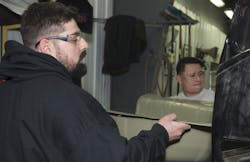SHOP STATS: County Line Auto Body Location: Howell, N.J. Operator: Rich and Gary Gardella Average Monthly Car Count: 260 Staff Size: 10 Shop Size: 50,000 square feet (spread across 7 buildings) Annual Revenue: $9 million
“My wife told pretty much everyone she could that I was recognized. She even put it up on Facebook,” says Rob Kirk, a technician at County Line Auto Body in Howell, N.J., on receiving the Russ Robson Scholarship from AASP/NJ. “She’s really proud. It’s a great honor to be recognized in the collision industry.”
The award, which was named in honor of the former AASP/NJ member who has since passed, recognizes a standout member of the collision repair industry and includes a monetary endowment to further the recipient’s studies.
County Line Auto Body owner Gary Gardella Jr. nominated Kirk because of his dedication to learning and implementing repair procedures and his ongoing commitment to furthering his knowledge. Gardella added that any knowledge Kirk gathers is passed on to the rest of the shop. Whether it’s looking to veteran technicians or the 50 hours of continued training he’s completed this year, Kirk’s commitment to performing the best possible repair shines through.
Kirk, who has been at County Line for the past two years, has become the shop’s go-to-person for checking work and has become a quasi mentor for newer employees.
“They know they can come to me if they ever have a question,” Kirk says.
Being a role model of sorts is something that Kirk doesn’t take lightly. His goal in 2018 is to develop his mentorship skills even more and become an even better resource than he already is.
I get in the shop between 7 and 7:30 a.m. It kind of depends on when my kids wake up. The shop opens at 8, so I take that time to get my game plan for the day. If I have a job left over from the day before, I’ll think about it on the ride over. If I don’t, I’ll check the paperwork that’s come in and talk to the shop manager about the day. Then, I get to work.
You have to treat every car like you’re going to put your kids in the back. If I wouldn’t put my kids in the back, it’s not ready. Car seats in the back of cars remind you of the importance of proper repair procedures. If Ford and Honda say to fix a vehicle a certain way, they obviously know what they’re talking about. You need to follow it. You need to do everything you can to protect that person.
Every single car that comes in, I check on the procedure. Every job is different—from welding a rail on a Ford pickup to working on small body panel on a Honda Accord. A vehicle may look the same as one that you’ve just worked on, but it could be a different turnstyle or gear that impacts the procedure. I print it out. That extra 10–15 minutes it takes is worth it. You need to double check. If the procedure is vague, dig a little deeper. If I don’t know what to do, I’ll ask someone for help.
Each day is different, but I’m mostly performing repairs. The shop is split between seven buildings. I’m in the large body shop building and I pretty much stay in there. The other buildings are a decal area, a mechanical shop, a teardown area, a paint shop, a prep garage and another building that’s used for aluminum. Sometimes, I’ll help out with teardowns if there’s a hot vehicle that needs to get in and out quickly—but even then, the vehicle is sent to my area. There’s not much walking back and forth.
I’m a people watcher. The guys that have been doing this for years, I’ll often ask for their advice and ask if they’ve seen a particular job before. They’re the people that you learn from. They know how to handle the toughest situations. I watch what they do and I’ll try it out to see if it works for me.
Since I’ve been here, I’ve been fortunate enough to have people help me. I try to be that same person for others. For about a year now, I’ve been checking other people in the shop’s procedures. I think Gary picked me for this role because I really invest myself in it. On my drive home, I’ll think about what I’ve done throughout the day and the procedures and make a note if I need to double-check something. My mind is always there.
It only takes a couple of seconds to point something out to someone. If someone comes to me with a question, I have no problem helping them out. I know this is a time-driven industry, but if you worry about your time too much, you can get lost. We need young people in the industry and it’s been pretty awesome getting involved with them and helping them find their way.
A lot of young people entering the industry get discouraged. There are a lot of negative attitudes. I think it’s important to show them that the field is becoming more technical and that it’s a really great career. It’s so much more than what it used to be. It’s no longer just panel beating.
I’m never done learning. Since I’ve been here, it’s been eye-opening. I’ve gone to Texas twice and Wisconsin for different training. We do a lot with I-CAR. I’ve done hands-on training for aluminum, steel and silicon bronze welding. We don’t have a set amount of hours we need to complete throughout the year. Gary sends us whenever he thinks it’s beneficial.
I’m the type of person that if I notice I’ve done something wrong, I’ll work on doing it better. Moving forward, I want to be a better mentor and be able to help people more effectively. I’m not what you would call a “social butterfly,” so I’d like to be able to develop better communication skills. In the past, I would shut down and keep to myself. Now, I make a conscious effort to work on that and be aware of when I’m doing that.
When it comes to balancing my own work and mentoring people, I just take it day by day. Yesterday, for example, I was helping out a newer guy with electronic measuring. We worked on that in the morning, and in the afternoon we worked together on structural stuff. If I have to stay late or go in early to make up for the time I spent helping, I’m happy to do it.
At the end of the day, Gary and I will talk. We’ll go over the day and discuss any certifications we think we should be looking at. I’ll also let the shop manager know where I’m at with any ongoing jobs. It’s all about communication. If everyone knows where everyone is at, it’s much easier to run—especially a big shop.
I usually leave by about 6 p.m. Not too late. A lot of people comment on how much I work and that I’m here too much, but I feel like working at County Line, I have much more time with my family than I did at the places I worked before. Here, I get home with enough time to spend some time with my kids before I put them to bed. I’ve found a good balance.

